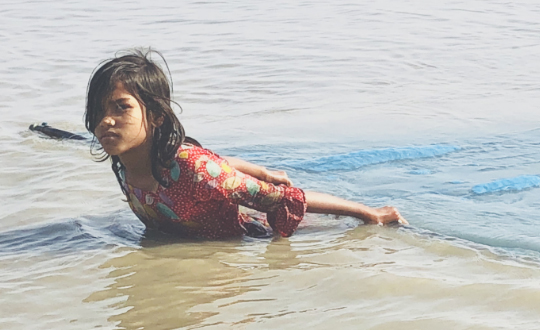What is Global March doing to address child labour?
To address the root causes of child labour, Global March Against Child Labour has developed these interventions:
Using area-based approaches to build child friendly communities and supply chains
We believe that systemic change can only be achieved when the affected - children and community become change agents. Thus, we work with communities, farmers, producers and other key stakeholders to enable a child friendly environment using good practices and techniques such as a child labour monitoring system and child friendly villages to address child labour with a rights-based, participatory and community-led approach.

Improving food security and impacts of COVID-19
Covid-19 led to multiple destructions in the supply chain of the agro-commodities and income of people in agro-rural communities. Millions of children and their families also lost access to basic needs such as food, increasing the incidents of child labour on farms and number of out-of-school children as schools remained shut.
To secure food and prevent children from entering hazardous work, we are implementing “seeds for education” in Uganda and “saline farming” in Bangladesh , both regionally tailored and unique solutions to address the absence of the school feeding programmes, curb the incidents of child labour and minimise the negative impacts of COVID-19.
OUR REGIONAL INTERVENTIONS IN UGANDA AND BANGLADESH
Uganda
Child friendly coffee plantations
Despite employing 70% of the population, Uganda faces a problem of low agricultural output and thus low returns. Lack of mechanized equipment, small farm holdings and inadequate knowledge on sustainable farming are the primary reasons why this cycle of insufficient income lands them into poverty. Due to this disrupted socio-economic structure, the agriculture sector finds it hard to survive and farm workers’ income loss attracts children to be a helping hand owing to their easy availability and low cost. Repercussions are seen in an army of uneducated youth, increased risk of gender based violence, nutrition deficiency and other health hazards that come with child labour in agriculture.
Passing the mic to the communities for child labour monitoring
To eliminate child labour from coffee plantations, we are implementing the Child labour Monitoring System (CLMS) as a tool to administer area based approach and anchor Child Friendly Village Model (CFV) tofocus on community participation and decentralised governance by forming community groups. The idea is to regularly observe and identify child labourers, keep track of children who are out of school, irregularity in theirr attendance and thereby let communities act as vigilantes against child labour, rescue and refer these children to services like education, health, vocational training, etc. Stakeholders ranging from grassroots organisations, to duty bearers such as the district labour officers, community development officers or the coffee companies jointly work to create awareness through campaigns and drives.
Seeds for education
Under our school feeding program, farmers and school management have been planting maize and beans to promote increase in school attendance, school retention and reduce food insecurity and nutrition issues amongst children, thereby preventing them to engage in child labour. We advocate for its sustainability with the targeted stakeholders such as the government and expect them to include such interventions in their mainstream policies to benefit vulnerable children; the community members; farmers; parents; school teachers, school authorities to attain quality education for all and eradicate child labour.

A farmer growing maize for the school feeding programme
Bangladesh
Child labour free shrimp
Shrimp cultivation is a necessity for the populations living on the external coastland in Bangladesh. Shrimp fry remains collection remains legally banned, yet, many child labourers are engaged in hazardous labour collecting shrimp fry in the wild. Existing literature reveals that child labour among other human rights abuses is rampant in collection and sorting of shrimp and shrimp processing in Bangladesh. Some Bangladeshi families are also subjected to debt bondage in shrimp farming. The types of hazardous work prohibited for children in Bangladesh do not cover fish drying, making it even more difficult to eliminate child labour as it intensifies the overall number of economically active children working in its worst forms of child labour.

A girl catching shrimp fry in the wild
Saline farming
Bangladesh is particularly vulnerable to climate change, with extreme weather and temperature changes significantly changing the conditions for growing food and water management challenges make it worse. GMACL is working with agricultural experts and the horticulture department to implement saline farming in the targeted areas in the form of kitchen gardens and collective farming ensuring education for children and preventing child labour. With this technique food is produced on salt-affected soils and salt or brackish water is used for irrigation. With saline affected areas being cultivated again, it will help supplement the shrimp output and thus inflow extra income to farmers. This income will then ensure food security and their children can go back to school, preventing child labour.



